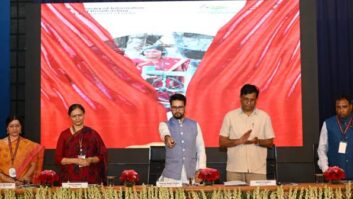I agree with Zane Ibrahim, founder of Bush Radio in South Africa; I see community radio as being “90 percent community and 10 percent radio.”
Like our public libraries and community centers, community radio offers hands-on access and connection, education and entertainment that feeds and strengthens us all. Community radio adds another dimension to public services; it acts like “community glue” — building bridges among unlikely groups of people representing different interests and demographics.

I’ve worked in public and community media for almost 15 years. While at a station near Seattle in 2010, I met with the CEO of Brown Paper Tickets, which is a ticket trading and events company. He asked what I’d do to strengthen communities, if I were paid full-time to do it. I told him I was passionate about equitable community development through a media lens. With that goal in mind, I would focus on strengthening nonprofit media, communications policy and municipal broadband.
I thought he might become an underwriter. Instead, he offered me a job as a “doer.”
NOT-JUST-FOR-PROFIT
The Doer Program is an expression of the Brown Paper Tickets’ not-just-for-profit business model that goes above and beyond corporate citizenship.
Doers, like myself, are hired to create positive change, with no metrics for sales of any kind. My work is just one of many demonstrations of Brown Paper Tickets’ commitment to prioritizing social responsibility over making the highest profit.
It’s a humbling and exciting experience to be able to do this work across a spectrum of public interest media, including NPR/PBS, volunteer community radio, public access and government TV, and independent online media. Over the last four years, I’ve developed several projects related to how we pay for public media, how those institutions turn outward and do community engagement and how we strengthen communications infrastructure. This last one is why I spend time on advocacy for an open Internet, municipal broadband and the build-out of low-power FM.
In 2013, I created the National Make Radio Challenge, as part of our contribution to the community radio movement — a campaign to educate and inspire as many nonprofits as possible about their opportunity to apply for low-power FM radio licenses. In some cities, with crowded media markets, this would be a once-in-a-lifetime chance. My team created resource guides to show applicants how to find local funding that would help them to fuel their growth. I conducted individual coaching sessions and connected interested groups to several organizations offering technical assistance and leadership, such as Prometheus Radio Project, Common Frequency, supportive engineers and volunteers.
MEDIA ECOSYSTEMS
Now that construction permits are being granted, I’m encouraging the new stations to be digital first, to develop a strong identity and to think of their terrestrial signals as magnets that excite their communities and pull them in. I’m encouraging them to assess and to reimagine their local public media ecosystems. This could take the form of building strength through partnerships with mission-aligned media and libraries, or creating multiplatform community media hubs.
I’m helping applicants to build organizational capacity and supporting them with knowledge, connections and wisdom gleaned from other committed and passionate community media advocates I’ve met by co-producing workshops for the National Federation of Community Broadcasters and the Alliance for Community Media. As a result, we are experimenting with pilot projects for outreach, digital storage and other initiatives that can be replicated across the country.
I’ve never seen this much excitement about community media.
For example, here in Seattle, I’ve created a Puget Sound Neighborhood Radio Cohort, the nation’s first support network for regional LPFM radio applicants to pool resources and foster a learning community and a network for sharing resources for these tiny-but-fierce stations. It’s working.
Some stations I’m working with are shown on this map (at left). You can see that they will cover most of the Puget Sound area, which is why we called it the “Sound of Tomorrow.” Ha!
Community radio is in transition as more than 1,400 low-power FM applicants already have their construction permits and are building their stations; it’s a massive infusion of new energy and ideas. Through LPFM, anyone can become part of the voice of their community, whether that takes the form of starting conversations, sharing health and emergency response information or featuring local musicians, artists and other forms of local culture.
Brown Paper Tickets is producing an ongoing series of videos to spotlight people who, like the doers, have found a way to do what they are passionate about.
The latest video in the series is about those who love free-form radio, called “Indy Radio DJ Love.” Watch it, here: http://bit.ly/1BALY9h.
If you have any questions about the Doer Program, any of my initiatives in public media and municipal broadband, or the Not-Just-For-Profit business model, give me a shout. And if you would like access to resources to help build your LPFM station, you can find contact information here: http://bit.ly/1KezaLw.
There’s a wide net of support for all kinds of public media. I’d love to be your tour guide, and to hear your insights!
Sabrina Roach was recruited to the Brown Paper Tickets Doer Program after 11 years in public radio. She now focuses on exploring financial models, deepening community engagement practices and researching methods for measuring the impact of public media. She has worked at KBCS(FM) Community Radio and KUOW(FM) Puget Sound Public Radio.










